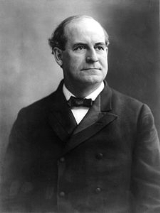
politician
in the late-19th and early-20th centuries. He was a dominant force in the liberal
wing of the Democratic Party, standing three times as its candidate for President of the United States
(1896, 1900 and 1908). He served in the United States Congress
briefly as a Representative
from Nebraska
and was the 41st United States Secretary of State
under President
Woodrow Wilson
, 1913–1916. Bryan was a devout Presbyterian
, a supporter of popular democracy
, an enemy of gold
, banks and railroads, a leader of the silverite
movement in the 1890s, a peace advocate, a prohibition
ist, and an opponent of Darwinism
on religious grounds.
Success is brought by continued labor and continued watchfulness. We must struggle on, not for one moment hesitate, nor take one backward step.![]()
A man who murders another shortens by a few brief years the life of a human being; but he who votes to increase the burden of debts upon the people of the United States assumes a graver responsibility.![]()
The poor man who takes property by force is called a thief, but the creditor who can by legislation make a debtor pay a dollar twice as large as he borrowed is lauded as the friend of a sound currency. The man who wants the people to destroy the Government is an anarchist, but the man who wants the Government to destroy the people is a patriot.![]()
Next to the ministry I know of no more noble profession than the law. The object aimed at is justice, equal and exact, and if it does not reach that end at once it is because the stream is diverted by selfishness or checked by ignorance. Its principles ennoble and its practice elevates. ![]()
You cannot judge a man's life by the success of a moment, by the victory of an hour, or even by the results of a year. You must view his life as a whole. You must stand where you can see the man as he treads the entire path that leads from the cradle to the grave — now crossing the plain, now climbing the steeps, now passing through pleasant fields, now wending his way with difficulty between rugged rocks — tempted, tried, tested, triumphant.![]()
I have been so satisfied with the Christian religion that I have spent no time trying to find arguments against it.… I am not afraid now that you will show me any. I feel that I have enough information to live and die by.![]()
The only purpose Mr. Darrow has is to slur at the Bible, but I will answer his question. I will answer it all at once, and I have no objection in the world. I want the world to know that this man, who does not believe in a God, is trying to use a court in Tennessee to slur at it.![]()

